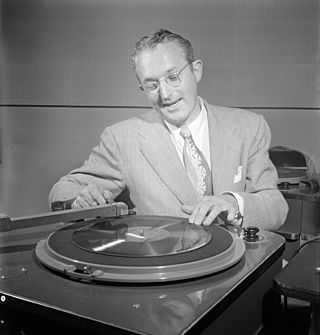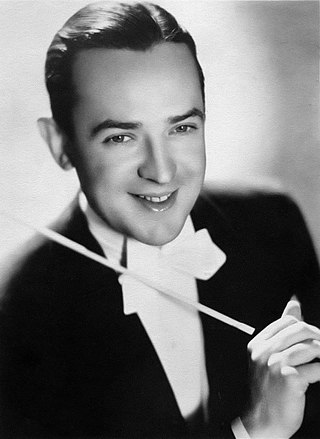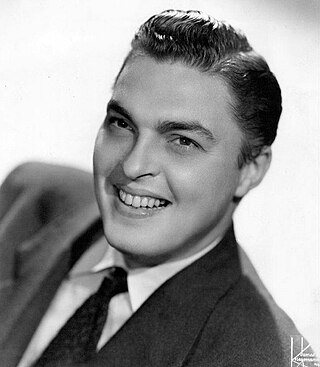Related Research Articles
This is a list of notable events in music that took place in the year 1943.

Thomas Francis Dorsey Jr. was an American jazz trombonist, composer, conductor and bandleader of the big band era. He was known as the "Sentimental Gentleman of Swing" because of his smooth-toned trombone playing. His theme song was "I'm Getting Sentimental Over You". His technical skill on the trombone gave him renown among other musicians. He was the younger brother of bandleader Jimmy Dorsey. After Dorsey broke with his brother in the mid-1930s, he led an extremely successful band from the late 1930s into the 1950s. He is best remembered for standards such as "Opus One", "Song of India", "Marie", "On Treasure Island", and his biggest hit single, "I'll Never Smile Again".

James Francis Dorsey was an American jazz clarinetist, saxophonist, composer and big band leader. He recorded and composed the jazz and pop standards "I'm Glad There Is You " and "It's The Dreamer In Me". His other major recordings were "Tailspin", "John Silver", "So Many Times", "Amapola", "Brazil ", "Pennies from Heaven" with Bing Crosby, Louis Armstrong, and Frances Langford, "Grand Central Getaway", and "So Rare". He played clarinet on the seminal jazz standards "Singin' the Blues" in 1927 and the original 1930 recording of "Georgia on My Mind", which were inducted into the Grammy Hall of Fame.

The Dorsey Brothers were an American studio dance band, led by Tommy and Jimmy Dorsey. They started recording in 1928 for OKeh Records.

Girl Crazy is a 1930 musical by George Gershwin with lyrics by Ira Gershwin and book by Guy Bolton and John McGowan. Ethel Merman made her stage debut in the first production and co-lead Ginger Rogers became an overnight star. Rich in song, it follows the story of Danny Churchill who has been sent to fictional Custerville, Arizona, to manage his family's ranch. His father wants him there to focus on matters more serious than alcohol and women but Danny turns the place into a dude ranch, importing showgirls from Broadway and hiring Kate Forthergill as entertainer. Visitors come from both Coasts and Danny falls in love with the local postmistress, Molly Gray.
"I Got Rhythm" is a piece composed by George Gershwin with lyrics by Ira Gershwin and published in 1930, which became a jazz standard. Its chord progression, known as the "rhythm changes", is the foundation for many other popular jazz tunes such as Charlie Parker's and Dizzy Gillespie's bebop standard "Anthropology ".

James Mundell Lowe was an American jazz guitarist who worked often in radio, television, and film, and as a session musician.
"Green Eyes" is a popular song, originally written in Spanish under the title "Aquellos Ojos Verdes" by Adolfo Utrera and Nilo Menéndez in 1929. The English translation was made by Eddie Rivera and Eddie Woods in 1931.

Robert Eberly was an American big band vocalist best known for his association with Jimmy Dorsey and his duets with Helen O'Connell. His younger brother Ray was also a big-band singer, making his name with Glenn Miller and His Orchestra.

The Fabulous Dorseys is a 1947 musical biopic which tells the story of the brothers Tommy and Jimmy Dorsey, from their boyhood in Shenandoah, Pennsylvania through their rise, their breakup, and their personal reunion. The film was also released under the alternate title The Fighting Dorseys.

I Dood It is a 1943 American musical-comedy film starring Red Skelton and Eleanor Powell, directed by Vincente Minnelli, and released by Metro-Goldwyn-Mayer. The screenplay is by Fred Saidy and Sig Herzig and the film features Richard Ainley, Patricia Dane, Lena Horne, and Hazel Scott. John Hodiak plays a villain in this production, just his third movie role. Jimmy Dorsey and his Orchestra provide musical interludes.

"Mississippi Mud" is a 1927 song written by Harry Barris, first sung by Bing Crosby as a member of Paul Whiteman's Rhythm Boys.

"I'm Glad There Is You " is a song written by Jimmy Dorsey and Paul Madeira first published in 1941. It has become a jazz and pop standard.

Swing jazz emerged as a dominant form in American music, in which some virtuoso soloists became as famous as the band leaders. Key figures in developing the "big" jazz band included bandleaders and arrangers Count Basie, Cab Calloway, Jimmy and Tommy Dorsey, Duke Ellington, Benny Goodman, Fletcher Henderson, Earl Hines, Glenn Miller, and Artie Shaw. Duke Ellington and his band members composed numerous swing era hits that have become standards: "It Don't Mean a Thing " (1932), "Sophisticated Lady" (1933) and "Caravan" (1936), among others. Other influential bandleaders of this period were Benny Goodman and Count Basie.
"I Hear a Rhapsody" is a 1941 pop song that became a jazz standard, composed by George Fragos, Jack Baker, and Dick Gasparre. Written in 1940, in 1941 it was a top 10 hit for three separate artists, Charlie Barnet, Jimmy Dorsey and Dinah Shore. “I Hear a Rhapsody” was at the top of "Your Hit Parade" in 1941. It was featured in the 1952 film noir Clash by Night, in which it was sung by Tony Martin. The soundtrack featured jazz notables such as pianist Gerald Wiggins, alto saxophonist Benny Carter, and tenor saxophonist Coleman Hawkins. The film, directed by Fritz Lang, involved a love triangle in a small fishing village and starred Barbara Stanwyck, Robert Ryan, and Paul Douglas.

"Harlem Chapel Chimes" is a 1935 jazz instrumental composed by Glenn Miller. The song was released as an A-side 78 single by the Dorsey Brothers Orchestra.
References
- 1 2 Wilson, Jeremy; Tyle, Chris; McElrath, K.J. "Star Eyes". JazzStandards.com. Retrieved 16 October 2013.